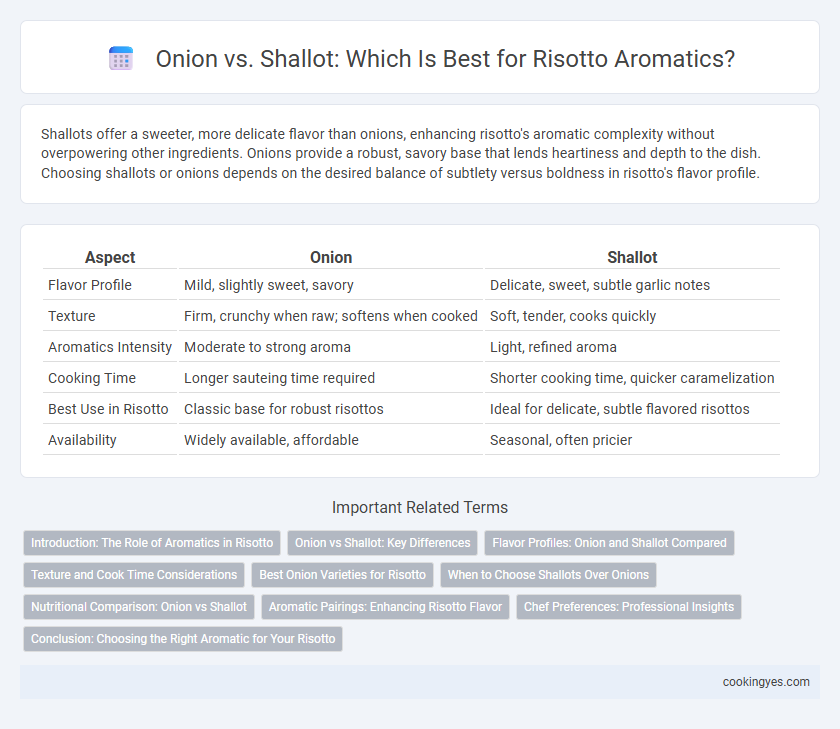Shallots offer a sweeter, more delicate flavor than onions, enhancing risotto's aromatic complexity without overpowering other ingredients. Onions provide a robust, savory base that lends heartiness and depth to the dish. Choosing shallots or onions depends on the desired balance of subtlety versus boldness in risotto's flavor profile.
Table of Comparison
| Aspect | Onion | Shallot |
|---|---|---|
| Flavor Profile | Mild, slightly sweet, savory | Delicate, sweet, subtle garlic notes |
| Texture | Firm, crunchy when raw; softens when cooked | Soft, tender, cooks quickly |
| Aromatics Intensity | Moderate to strong aroma | Light, refined aroma |
| Cooking Time | Longer sauteing time required | Shorter cooking time, quicker caramelization |
| Best Use in Risotto | Classic base for robust risottos | Ideal for delicate, subtle flavored risottos |
| Availability | Widely available, affordable | Seasonal, often pricier |
Introduction: The Role of Aromatics in Risotto
Onions and shallots both serve as essential aromatics that build the foundational flavor in risotto, with onions offering a stronger, more pungent profile while shallots provide a subtler, sweeter nuance. The choice between the two affects the depth and complexity of the dish's aroma, influencing the overall taste experience. Using finely diced onions typically results in a robust and hearty base, whereas shallots contribute a delicate, slightly floral undertone that enhances the risotto's creamy texture.
Onion vs Shallot: Key Differences
Onions and shallots differ significantly in flavor and texture, affecting risotto aromatics. Onions provide a robust, sharp taste with a slightly sweet undertone, while shallots offer a milder, delicate, and slightly garlicky flavor that enhances subtlety. Choosing shallots over onions results in a smoother, more refined aromatic base for risotto, ideal for recipes emphasizing nuanced taste layers.
Flavor Profiles: Onion and Shallot Compared
Onions provide a robust, slightly sweet flavor with a pronounced pungency that deepens the savory base of risotto, enhancing its richness. Shallots offer a milder, more delicate aroma with subtle hints of garlic and a gentle sweetness, contributing to a nuanced and refined flavor profile. Choosing shallots over onions results in a smoother, less intense aromatic layer, ideal for lighter risotto preparations and delicate ingredient pairings.
Texture and Cook Time Considerations
Onions provide a firmer texture and require a longer cooking time to soften, which allows them to develop a mellow sweetness that enhances risotto's depth. Shallots offer a finer texture and cook faster, imparting a more delicate and subtle flavor without overpowering the dish. Choosing between onion and shallot depends on balancing the desired texture and nuanced aromatic infusion for the perfect risotto consistency.
Best Onion Varieties for Risotto
Sweet onions like Vidalia and Walla Walla provide a mild, rich foundation ideal for risotto aromatics without overpowering the dish. Yellow onions offer a balanced flavor with subtle sweetness and are the most commonly used for traditional risotto recipes due to their versatility and caramelizing properties. For a delicate, slightly sharper flavor, pearl onions can be used sparingly to enhance the risotto's depth without masking the primary ingredients.
When to Choose Shallots Over Onions
Shallots are preferred over onions in risotto when a milder, sweeter, and more delicate flavor is desired to subtly enhance the dish's aromatic profile. Their fine texture and low pungency make shallots ideal for recipes emphasizing nuance and refinement, such as seafood or vegetable risotto. Choosing shallots can also improve the balance of flavors without overwhelming the creamy consistency that defines classic risotto.
Nutritional Comparison: Onion vs Shallot
Onions contain higher amounts of vitamin C and dietary fiber compared to shallots, supporting immune function and digestion when used in risotto aromatics. Shallots provide richer antioxidant compounds such as quercetin and kaempferol, which contribute to anti-inflammatory benefits and enhanced heart health. Both alliums contribute essential micronutrients and flavor complexity, making them valuable options depending on nutritional focus for risotto preparation.
Aromatic Pairings: Enhancing Risotto Flavor
Onions provide a robust, sweet base that intensifies risotto's savory depth, while shallots offer a subtler, more delicate flavor with mild hints of garlic, creating a refined aromatic profile. Pairing onions with earthy mushrooms or aged Parmesan amplifies umami richness, whereas shallots blend seamlessly with fresh herbs like thyme or tarragon, elevating subtle floral notes. Selecting between onion and shallot influences the risotto's aroma, texture, and overall flavor complexity to suit varied culinary intentions.
Chef Preferences: Professional Insights
Chefs often prefer shallots over onions for risotto aromatics due to their subtler, sweeter flavor that imparts a delicate depth without overpowering the dish. Shallots' fine, less pungent profile allows the creamy texture and rich flavors of the risotto to remain balanced while enhancing overall complexity. Professional kitchens prioritize ingredient harmony, making shallots a favored choice to achieve nuanced taste and refined culinary results.
Conclusion: Choosing the Right Aromatic for Your Risotto
Shallots offer a milder, sweeter flavor that blends smoothly into risotto, enhancing its delicate texture without overpowering other ingredients. Onions provide a stronger, more pungent aroma that adds depth and a robust base, ideal for heartier risotto varieties. Selecting shallots or onions depends on the desired flavor profile--shallots for subtle, nuanced dishes, and onions for bold, savory risottos.
Onion vs shallot for risotto aromatics Infographic

 cookingyes.com
cookingyes.com